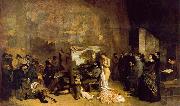Wholesale Oil Painting No Minimum |
|||||||||||
|
|
|||||||||||

|
|||||||||||
|
|
|
||||||||
Gustave Courbet1819-1877 French Gustave Courbet Locations was a French painter whose powerful pictures of peasants and scenes of everyday life established him as the leading figure of the realist movement of the mid-19th century. Gustave Courbet was born at Ornans on June 10, 1819. He appears to have inherited his vigorous temperament from his father, a landowner and prominent personality in the Franche-Comte region. At the age of 18 Gustave went to the College Royal at Besancon. There he openly expressed his dissatisfaction with the traditional classical subjects he was obliged to study, going so far as to lead a revolt among the students. In 1838 he was enrolled as an externe and could simultaneously attend the classes of Charles Flajoulot, director of the ecole des Beaux-Arts. At the college in Besançon, Courbet became fast friends with Max Buchon, whose Essais Poetiques (1839) he illustrated with four lithographs. In 1840 Courbet went to Paris to study law, but he decided to become a painter and spent much time copying in the Louvre. In 1844 his Self-Portrait with Black Dog was exhibited at the Salon. The following year he submitted five pictures; only one, Le Guitarrero, was accepted. After a complete rejection in 1847, the Liberal Jury of 1848 accepted all 10 of his entries, and the critic Champfleury, who was to become Courbet first staunch apologist, highly praised the Walpurgis Night. |
||||||||
|
|
||||||||
The Artist Studio
The Artist Studio Painting ID:: 58487 |
The Artist's Studio, 1855
The Artist's Studio, 1855 |
|||||||
|
|
||||||||
|
Hugh Ramsay Australian portrait painter , 1877 - 1906 was an Australian artist. Ramsay was born in Glasgow, Scotland, son of John Ramsay. He moved with his family to Melbourne in 1878. He was educated at Essendon Grammar School, and joined classes at the National Gallery of Victoria at age 16 under Lindsay Bernard Hall and became one of the most brilliant students ever trained there. He won several first prizes, and at the competition for the travelling scholarship held in 1899 was narrowly beaten by Max Meldrum, another student of unusual ability. Ramsay went to Europe in September 1900 and was fortunate in finding a kindred spirit, George Washington Lambert, on the same vessel. Arriving at Paris he entered Acad??mie Colarossi and was soon recognized as a student of great potential. He sent five pictures to the 1902 exhibition of La Soci??t?? Nationale des Beaux Arts and four of these were accepted and hung together. No greater compliment could have been paid to a young student. Another Australian student whose studio was in the same building, Ambrose McCarthy Patterson (nephew of Nellie Melba, then at the height of her fame). Ramsay was introduced to Melba, who gave him a commission for a portrait and would no doubt have been able to help him in his career. Unfortunately Ramsay became ill in Paris, and it became necessary for him to return to the warmer climate of Australia and the opportunity to paint Melba was missed. Before leaving Europe he had exhibited four pictures at the British Colonial Art Exhibition held in London at the Royal Institute galleries. Returning to Australia, in spite of failing health, Ramsay succeeded in doing some remarkable work including "The Sisters" now in the Sydney gallery, the "Lady with a Fan" (possibly his most famous painting), the portrait of David Scott Mitchell, and his own portrait now in the Melbourne gallery. He gradually became weaker and died on 5 March 1906. The artist studio The artist's studio (1901, oil on canvas, 60.8 x 50.2 cm) by Hugh Ramsay (1877-1906). cjr |
||||||||
|
|
||||||||
|
Prev Next
|
||||||||
|
|
||||||||
|
Related Paintings to Hugh Ramsay :. |
||||||||
|
|
||||||||
|
CONTACT US |

